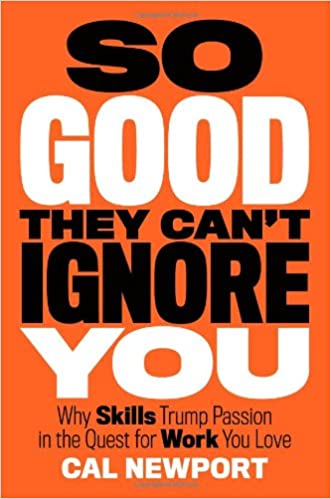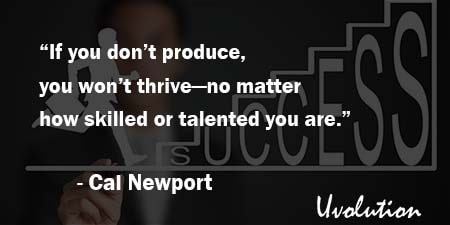So Good They Can't Ignore You by Cal Newport
The Book in 1 Sentences
So Good They Can't Ignore You: Why Skills Trump Passion in the Quest for Work You Love
“My question was clear: How do people end up loving what they do? And I needed an answer. This book documents what I discovered in my search.” ~ Cal Newport
5 BIG Ideas
1. You can actually love your job if you can create the right conditions for your autonomy, competence and relatedness!
2. Craftsman Mindset Vs Passion Mindset.
3. Deliberate practice might provide the key to quickly becoming so good they can’t ignore you. (10,000-hour rule of world-class performance)
4. Your career capital is your rare and valuable skills you can offer.
5. Finding the right work Vs working right!
So Good They Can’t Ignore You Summary
“This argument flips conventional wisdom. It relegates passion to the sidelines, claiming that this feeling is an epiphenomenon of a working life well lived. Don’t follow your passion; rather let it follow you in your quest to become, in the words of my favorite Steve Martin quote, ‘so good that they can’t ignore you.’ ...
It’s my hope that the insights that follow will free you from simplistic catchphrases like ‘follow your passion’ and ‘do what you love’—the type of catchphrases that have helped spawn the career confusion that afflicts so many today—and instead, provide you with a realistic path toward a meaningful and engaging working life.”
1. The 4 Rules
“RULE #1: Don’t Follow Your Passion
RULE #2: Be So Good They Can’t Ignore You (Or, the Importance of Skill)
RULE #3: Turn Down a Promotion (Or, the Importance of Control)
RULE #4: Think Small, Act Big (Or, the Importance of Mission)”
Those four rules are the four primary sections of the book.
In each section Cal discusses stories of various people who succeeded and also who failed in each rule.
So, let’s discuss some practical applications of these rules.
2. Self-Determination Theory (SDT)
“When [Dan] Pink talks about ‘what science knows,’ he’s referring, for the most part, to a forty-year-old theoretical framework known as Self-Determination Theory (SDT), which is arguably the best understanding science currently has for why some pursuits get our engines running while others leave us cold.
SDT tells us that motivation, in the workplace or elsewhere, requires that you fulfill three basic psychological needs—factors described as the ‘nutriments’ required to feel intrinsically motivated for your work:
Autonomy: the feeling that you have control over your day, and that your actions are important
Competence: the feeling that you are good at what you do
Relatedness: the feeling of connection to other people”
Cal tells us it’s not about finding our passion; it’s about loving what we’re already doing!
And for this to happen we need 3 things: Autonomy + Competence + Relatedness.
Think about that for a moment:
Do you feel that you have control over your day and your actions are important?
Do you feel that you are good at what you do?
Do you feel connected to other people in your work?
That’s really important… You can actually love your job if you can create the right conditions for your autonomy, competence and relatedness!
Cal also says: “Working right trumps finding the right work.”
3. Craftsman Mindset Vs Passion Mindset
“To summarize, I’ve presented two different ways people think about their working life. The first is the craftsman mindset, which focuses on what you can offer the world. The second is the passion mindset, which instead focuses on what the world can offer you.
The craftsman mindset offers clarity, while the passion mindset offers a swamp of ambiguous and unanswerable questions... there’s something liberating about the craftsman mindset: It asks you to leave behind self-centered concerns about whether your job is ‘just right,’ and instead put your head down and plug away at getting really damn good. No one owes you a great career, it argues; you need to earn it—and the process won’t be easy.”
Alright, let’s put it this way… “what you can offer the world” mindset Vs “what the world can offer you” mindset! Getting value vs Creating value!
If you have a sense of purpose and passion, and you want to serve others, that would be great for sure…
But always remember, it’s all about serving others. It’s about “what you can offer the world”.
So, Where’s your focus? Getting or creating value?
Cal says: “If you want to love what you do, abandon the passion mindset (‘what can the world offer me?’) and instead adopt the craftsman mindset (‘what can I offer the world?’)”
He also says: “Regardless of how you feel about your job right now, adopting the craftsman mindset will be the foundation on which you’ll build a compelling career.”
4. Deliberate Practice
“When I first encountered the work of Ericsson and Charness, this insight startled me. It told me that in most types of work—that is, work that doesn’t have a clear training philosophy—most people are stuck.
This generates an exciting implication. Let’s assume you’re a knowledge worker, which is a field without a clear training philosophy. If you can figure out how to integrate deliberate practice into your own life, you have the possibility of blowing past your peers in your value, as you’ll likely be alone in your dedication to systematically getting better.
That is, deliberate practice might provide the key to quickly becoming so good they can’t ignore you.
To successfully adopt the craftsman mindset, therefore, we have to approach our jobs... with a dedication to deliberate practice.”
Note: Ericsson and Charness are the researchers who first discovered the 10,000-hour rule of world-class performance.
So, to master any craft we need to stretch ourselves beyond our comfort zones over and over and over again! Deliberately practice trying to get better.
Cal says: “Another deliberate-practice routine was the introduction of my hour tally... The sheet has a row for each month on which I keep a tally of the total number of hours I’ve spent that month in a state of deliberate practice.”
There are more exercises and routines to implement this practice… If you’re interested get your copy.
Remember what Cal says: “Strain, I now accepted, was good. Instead of seeing this discomfort as a sensation to avoid, I began to understand it the same way that a body builder understands muscle burn: a sign that you’re doing something right.”
Ready to stretch yourself beyond your comfort zone?
5. Career Capital
“THE CAREER CAPITAL THEORY OF GREAT WORK
The traits that define great work are rare and valuable.
Supply and demand say that if you want these traits you need rare and valuable skills to offer in return. Think of these rare and valuable skills you can offer as your career capital.
The craftsman mindset, with its relentless focus on becoming ‘so good they can’t ignore you,’ is a strategy well suited for acquiring career capital. This is why it trumps the passion mindset if you goal is to create work you love.”
As we discussed in the last section, we put in the deliberate practice and effort in pursuit of becoming so good they can’t ignore us, so, we accumulate rare and valuable skills. And this career capital is the key to successfully creating sustainable work we love.
That’s why, for example, a passionate new yoga teacher who just completed a 200-hour certification process is not yet in a solid position to build a sustainable career.
So, passion is not enough, you must deliberately practice, so that you become so got they can’t ignore you!
6. Right Work vs. Working Right
“I argued in Rule #1 that ‘follow your passion’ is bad advice, as the vast majority of people don’t have preexisting passions waiting to be discovered and matched to a job.
In Rule #2, I then countered that people with compelling careers instead start by getting good at something rare and valuable—building what I call ‘career capital’—and then cashing in this capital for the traits that make great work great.
In this understanding, finding the right work pales in importance to working right.”
So, it’s not about finding the right work! We really need to work right and get so good they can’t ignore us!
Ready? 🙂
That was my QUICK So Good They Can't Ignore You summary. If you’re interested, get your copy. There is a HUGE amount of wisdom and life-changing ideas in this book, and we’ve only touched on a tiny bit of it.
Buy The Book: So Good They Can't Ignore You by Cal Newport

GET Blinkist 7 Days FREE Trial
3000+ Book Summaries
(Audio and Text)





